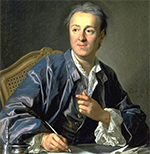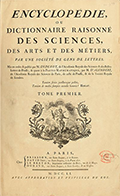Denis Diderot: Philosophe Leader
Denis Diderot was a thinker and writer in 18th Century France. He is perhaps most well-known for his Encyclopédie, a multiple-volume set of writings and illustrations that espoused the thinking behind the Enlightenment. 
He was born on Oct. 15, 1713, in Langres. An excellent student, he attended the Jesuit college at Louis-Le-Grand when he was 16. In 1732, he earned his master's degree in philosophy from the University of Paris. He later studied law. In 1741, he met the woman he would marry, Antoinette Champion. Angéique was the only one of their three children to survive into adulthood. Diderot met Jean-Jacques Rousseau the following year. They would become two of the leading French philosophes, leading the drive to champion reasoned discussion as means of looking at the world. Among Diderot's famous quotes were "Those who fear the facts will forever to try to discredit the fact-finders" and "All things must be examined, debated, investigated without exception and without regard for anyone's feelings." In 1743, he took to translating English books into French. Three years later, André François le Breton named Diderot the General Editor for a 10-volume encyclopedia the goal of which was to include all human knowledge. He spent the next 26 years in various capacities–research, writing, editing. Diderot is thought to have written Diderot had earlier kept up his own writing, publishing philosophical works such as Philosophical Thoughts (1746), Sceptics Walk (1747), and Letters on the Blind (1749). He targeted organized religion, specifically Catholicism, in his writings, and he went to prison for three months as punishment for this; his solution when he got out of prison was to continue writing such things but not publish them. He also wrote plays, novels, and art criticism, all of which had a philosophical bent. In his last years, he turned to writing history. His publications numbered in the several dozens, including many that saw the light of day only after his death. In the realm of drama, he also credited with creating the convention of the "fourth wall," the invisible barrier between the performers of a play and the audience who are viewing that play. He sold his library to Catherine the Great, who said that he could keep his books until she wanted them but urged him to come to Russia; he did so, staying for a time, but eventually returned to Paris, where he died, on July 30, 1784.
|
|
Social Studies for Kids
copyright 2002–2026
David White



 several thousand articles himself. Helping with the task with Jean le Rond d'Alembert, a well-known mathematician. Volumes appeared progressively, beginning in 1751. Opposition from Jesuits and others forced a work stoppage; publication resumed, and volumes once a year until 1759, when the Royal Council stopped work entirely. The complete work saw the light of day in 1772: It was 17 volumes of words and 11 volumes of illustrations.
several thousand articles himself. Helping with the task with Jean le Rond d'Alembert, a well-known mathematician. Volumes appeared progressively, beginning in 1751. Opposition from Jesuits and others forced a work stoppage; publication resumed, and volumes once a year until 1759, when the Royal Council stopped work entirely. The complete work saw the light of day in 1772: It was 17 volumes of words and 11 volumes of illustrations.
